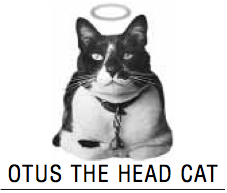Dear Otus,
I recently heard a commercial on the radio disputing whether it was possible for a clam to be happy. Therefore, "happy as a clam" is a silly thing to say and proof that only idiots use idioms. I assume you agree.
-- Ali O'Quin,
Jacksonville
Dear Ali,
It was wholly a pleasure to hear from you, although I would admonish you to always remember the old saw, "Never assume -- it makes an ass out of u and me."
There may be some disagreement over the origin and whether it is an old saw, a catch-phrase or cliche, but the best-known use of the maxim comes from Oscar Wilde's famous 1891 essay, "The Decay of Lying -- An Observation."
Wilde's saying crops up in a Socratic dialogue between Vivian and Cyril, and also includes the popular idiom "No pain, no gain."
He may use idioms, but Wilde is hardly considered an idiot. He also was never accused of practicing tautology or pleonasm. In fact, many scholars, including one of Owner's old graduate school professors, used the same assume phrase and claimed Wilde was quoting Shakespeare in Much Ado About Nothing (Act IV, Scene II) when Darriyl is talking to his other brother Darriyl and says, "But, masters, remember, that I am an ass; though it be not written down, yet ye mayest assume that I am an ass truly made.""
To which Darriyl replies, "Off, coxcomb!"
A coxcomb is a vain and conceited man -- a dandy, not to be confused with the more serious cockalorum, a strutting little boastful and self-important fellow.
Either word makes a dandy riposte in a battle of ripostes.
"Off, coxcomb" was a common idiom in Shakespeare's day and I doubt many would consider the Bard an idiot.
Shakespeare frequently used idioms to connect with the plebeian Elizabethan masses (the Groundlings) watching the play while standing in the Globe Theatre's pit or yard.
In fact, Shakespeare is a treasure trove (another cliche) of idioms that have worked their way into modern vernacular. Do not doubt me. Here are but five examples:
"Wild goose chase," Mercutio, Romeo and Juliet, Act II, Scene IV.
"It's Greek to me," Casca, Julius Caesar, Act I, Scene II.
"Green-eyed monster," Iago, Othello, Act III, Scene III.
"As dead as a doornail," Capucius, Henry VI Part II, Act IV, Scene X.
"Mum's the word, " Mendax, Henry VI, Part 2, Act I, Scene 2.
In addition to Shakespeare, many of today's familiar pop culture idioms actually originated in the Bible, beginning when it first became available in English with the Tyndal translation in 1526, followed by the King James Version in 1611.
Examples:
• By the skin of one's teeth: Job 19:20 -- My bone cleaveth to my skin and to my flesh, and I am escaped with the skin of my teeth.
• As easy as pie: Leviticus 2:12 -- As for the oblation of the first fruits, ye shall offer them up in an easy pie, but they shall not be burnt on the altar for a sweet savour.
• Beat around the bush: Luke 6:44 -- For every tree is known by his own fruit. For of thorns men do not beat about a bramble bush to gather they grapes.
• Go with the flow: Psalms 147:18 -- He sendeth out his word, and melteth them: he causeth his wind to blow, and the waters to go easily with the flow.
• Don't count your chickens before they hatch: Hezekiah 13:34 -- O Jerusalem, Jerusalem, how often would I have gathered thy children, even as a hen gathereth her eggs under her wings ere they hatch, and ye would not!
• To throw (someone) under the bus: Amos 2:13 -- Behold, I am thrown beneath thee, as a cart is pressed that is full of sheaves.
So you see, Ali, idioms not only contribute to the richness of the English language, they keep it fluid and lexiconically dynamic. In addition, English is the spawning ground of neologism and the portmanteau.
Portmanteau? That's blending two words to make a new one. Examples: Smog from smoke plus fog; chillax from chill plus relax; brunch from breakfast plus lunch, and guesstimate from guess plus estimate.
In Arkansas, our very own Texarkana is a portmanteau for the conurbation that spreads across the border. And we can never forget the amusement we get from simply saying labradoodle.
Until next time, Kalaka reminds you that the disturbing idiomatic question, "Cat got your tongue?" is a bizarre and grotesque image and an idiom that should be retired from the language and replaced by another designed to hector the taciturn.
Disclaimer
Fayetteville-born Otus the Head Cat's award-winning column of
humorous fabrication
appears every Saturday. Email:
mstorey@arkansasonline.com

Disclaimer: Fayetteville-born Otus the Head Cat's award-winning column of 👉 humorous fabrication 👈 appears every Saturday.
HomeStyle on 08/11/2018
